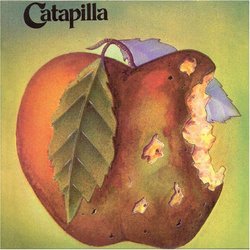Fascinating progressive jazz rock
BENJAMIN MILER | Veneta, Oregon | 04/29/2002
(4 out of 5 stars)
"From 1969 to around the mid 1970s, or thereabout, a small British label came by the name of Vertigo, and released a load of great albums. The label got started with the release of Colosseum's Valentyne Suite in 1969, and many more bands hopped on board including Gentle Giant, Gracious, Cressida, Affinity, Beggars Opera, May Blitz, Black Sabbath, Magna Carta, Uriah Heep, so many more bands. Catapilla was yet another one of these bands on this label. The two key members of the band were female vocalist Anna Meek, and saxist Robert Calvert (apparently, not THAT Robert Calvert from Hawkwind, but someone else with that name). The rest of the band consisted of drummer Malcom Frith, guitarist Graham Wilson, bassist Dave Taylor, and two other wind players, Hugh Featherstone and Thiery Rheinhart. The band was formed at the end of 1970, and originally featured Anna Meek's sister Jo Meek on vocals. Jo left because apparently British author Julian Jay Savarin (who was also involved in a prog band called Julian's Treatment) wanted to record an album called Waiters on the Dance in 1971 (some sources say this album was released in 1969 before Catapilla's formation or Julian's Treatment) and Jo Meek ended up singing on that album and her sister Anna came in for Catapilla, and they went to work on an album. This self-entitled offering was originally released in 1971, and consisted of only four cuts, one a side length cut. The biggest problem I have with this album is Anna Meek herself. Where such prog bands fronted by female vocalists like Renaissance or Holland's Earth & Fire tend to have very pleasing vocals, Anna Meek's voice tends to be rather harsh and hard to take in. But the album is still packed with great music. "Naked Death" is over 15 minutes long and features some truly great, grooving jams. There's a couple of shorter pieces too, including "Tumbleweed" and "Promises". For some reason or another, I find the lyrics to "Tumbleweed" hard to take in (ie, "she's got the same dimple smile, as her grandfather"). These two tend to be more brass-driven progressive jazz rock that's found on the Vertigo label, like Affinity. Then the album closes with the 24 minute "Embrionic Fusion" which shows the band at their best, with Anna Meek psychotic rants, great jams, excellent sax work from Robert Calvert, and so much more. This album is definatley an acquired taste, to say the least (particularly the vocals), but it's still quite a fascinating progressive jazz rock album. Sadly, Catapilla didn't last long. The band featured some lineup changes, and released one more album called Changes in 1972, before vanishing for good."
An original groove band
Robert Cossaboon | The happy land of Walworth, NY | 11/03/2002
(3 out of 5 stars)
"Give them this much, when Catapilla locked itself in a groove and rode it out, they were unstoppable. The trouble is, when the groove comes, as in "Naked Death", it usually takes awhile for the band to build up to the jam, but it's worth the wait once they take off. Of the two short tracks, "Promises" is the more listenable of the two, because of the instrumental break in the middle. These songs, however, are Meeks's vehicle for her howl/recitation of her lyrics. "Embryonic Fushion" starts out promisingly enough, even a with a little taste of the exotic, but never really decides where it wants to go. Just when it seems as if the band is going to take off on an awesome solo flight, Meeks's vocals constantly ground it. The strengths of this song and this album ultimately outweigh the vocal weaknesses. At their finest Catapilla closely resemble the greatness of Colloseum's 'Valentine Suite' as elements of swing and psychedelia are neatly woven into a fine rhythm section. A word about Anna Meek, however; she is a fine vocalist . . . well, she's something else. The closest female contemporary who could compliment her vocal description would be Dagmar Kraus from Slapp Happy and Henry Cow. The trouble is, Meeks ranting, half-understood vocals aren't appropriate for the Jazz-Rock fushion Catapilla are trying to achieve and this, more than anything else, torpedoes this album."


 Track Listings (4) - Disc #1
Track Listings (4) - Disc #1